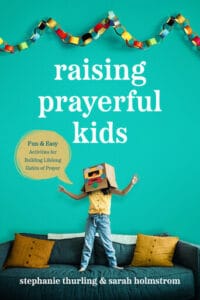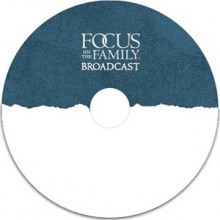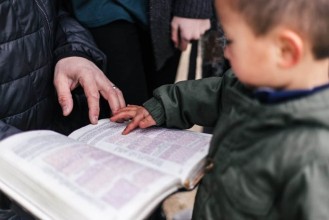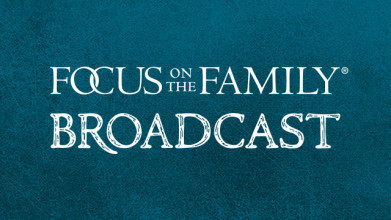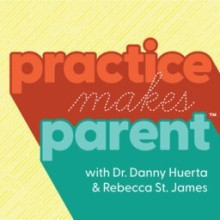Man #1: Yes, I believe praying for my kids is important. But, ah, we get so busy, it’s hard to keep up with it.
Man #2: Prayer sounds like a good idea, but how do I start?
Woman #1: My kids need lots and lots of prayer, if you get my drift.
Woman #2: Of course, I pray for my kids all the time. But help me, Lord.
John Fuller: Well, do you pray for your children? And if so, a lot or a little? Do you pray with confidence, or maybe some desperation? Uh, today on Focus on the Family, we’ll explore why prayer is an important part of your parenting journey, and how you can activate your children to pray. Uh, thanks for joining us. I’m John Fuller, and your host is Focus president and author, Jim Daly. And Jim, this is an appropriate topic for today, the National Day of Prayer here in the US.
Jim Daly: Well, it’s great. When you said that about confidence or desperation, the answer is yes and yes.
John: Yeah. (laughs)
Jim: Right? (laughs)
John: Yes.
Jim: Some days it’s confidence and some days it’s desperation. But I want to encourage our listeners and viewers to take a few moments, uh, sometime today to pray for this National Day of Prayer. Pray for the nation, for the president. I don’t care about the party. We gotta pray for who’s in authority over us. That’s what the scripture talks about.
John: Mm-hmm.
Jim: Pray for wisdom, obviously, for Godly wisdom. And then, uh, pray your marriage, and your family.
John: Mm-hmm.
Jim: And that’s a good way to end on this National Day of Prayer. You know, uh, I- I would hope as Christian parents that we approach prayer with more confidence than fear.
John: Hmm.
Jim: And, you know, I, I’ve often said I have, uh, these unbelieving friends that don’t believe in Jesus. And when we look nervous, uh, one of them said to me, “If you guys are nervous, I should be really nervous.”
Sarah Holmstrom: (laughs) Right?
Jim: ‘Cause we are people of hope.
Sarah: Yeah.
Jim: And the, the Lord said, “Fear not.” How can we live each day in that kind of context?
John: Mm-hmm.
Jim: It’s not always easy, and we recognize that. But that’s what we should be about. People should look at us and go, “Wow, why are you so joyful and so hopeful,” right? That should be our characteristic. So today, we’re gonna talk about raising prayerful kids, and doing so, in such a way that really puts the Lord on display in such a positive way.
John: Mm-hmm.
Jim: That said, uh, I get it. Praying about your kids in front of your kids can feel a little odd. Jean and I have done that. I mean, you know, we do… every morning, we do a devotion, and we pray together.
Sarah: Mm-hmm.
Jim: And sometimes the boys caught it. Sometimes they’re, like, right in their cereal. (laughs)
Sarah: Mm-hmm. (laughs)
John: Yes.
Jim: But it is kinda interesting. Here at Focus, we, uh, want you to be the most equipped parents you can be. And that’s one of the reasons that we’re airing content like this. And you can go to the website, get far more. We have age and stage content for you. We have so many great helps for you as a parent. Tap into it.
John: Mm-hmm.
Jim: And, uh, you know, get connected to us.
John: Yeah, the links are in the show notes, or, uh, give us a call. Well, today we have Sarah Holmstrom and Stephanie Thurling with us. Uh, they’re co-founders of a ministry called Raising Prayerful Kids. And, uh, together they’ve written a book, uh, with that same title, Raising Prayerful Kids: Fun and Easy Activities for Building Lifelong Habits of Prayer. We have copies of that. Um, the website is focusonthefamily.com/broadcast, or call 800, the letter A, and the word, FAMILY, to learn more.
Jim: Steph and Sarah, welcome to Focus on the Family.
Stephanie Thurling: Hi.
Sarah: Thank you.
Stephanie: Thank you for having us.
Jim: It’s so fun to see young moms here. I just love it.
Sarah: (laughs) Oh, we are so honored-
Jim: No, it’s so great.
Sarah: … and so excited to be with you guys.
Jim: Okay, so your kids are how old? This is the best part.
Sarah: So fun. Okay, so my oldest is 11 and a half. He’d want you to know.
John: And a half.
Sarah: Almost 12. And then I’ve got almost 10. (laughs) And seven.
Jim: These are descriptions that they gave you.
Sarah: Oh, yeah, yeah.
Jim: Tell them I’m almost 10. (laughs)
Sarah: Don’t forget the half. Seven and five. So, we are kinda out of that, you know, keeping them alive stage.
Jim: Yeah, you’re in the fun time.
Sarah: It’s so fun.
Jim: It’s… It is a great time.
Sarah: It’s loud and wild, but yeah.
Jim: And how about yours? How old are your-
Stephanie: Our kids are almost the same age.
Jim: Okay.
Stephanie: So, mine are 12, 9, and 8.
John: Mm-hmm.
Stephanie: Yeah.
Jim: All right. That is awesome. I… That helps every mom listening to kinda know what you’re living.
Sarah: Yeah.
Jim: And- and some are there, some are gonna be there, and some are way past there.
Sarah: Yes.
Stephanie: Yes.
Jim: So, uh, Steph, let’s start with you. You have three, and Sarah, four as you said. And all in that preschool age to elementary school.
Stephanie: Mm-hmm.
Jim: You admit parenting young kids is intense. Do we have an amen to that? (laughs)
John: Uh, yes.
Stephanie: Mm-hmm, mm-hmm.
Jim: I mean, you’re so hands on. And, uh, Sarah, in fact, you have a story about, uh, a 911 call. I think you did.
Sarah: I do.
Jim: We had a couple of those-
Sarah: Oh good.
Jim: … but what’s your 911 story?
Sarah: I’m not alone. I love that you-
Jim: Yeah. You’re not a failure.
Sarah: I thank you. I love that you asked me that because when this 911 call happened, I called my husband and I said, “We’re never telling anybody about this.”
Jim: (laughs) And now you’re telling everybody.
Sarah: (laughs) And now I’m telling everybody.
Jim: Let’s just tell a couple of million people.
Sarah: Right? Let’s tell ’em. Well, I was at home with my kids. And this was five years ago so the youngest was a baby and-
Jim: It’s good you were there with your kids.
Sarah: I was there, right?
Jim: (laughs)
Sarah: My husband wasn’t there. But um, my daughter, the two-year-old, she peed her pants again-
Jim: (laughs)
Sarah: And we all know how that goes. So I’m kind of changing her and my s- my baby son, I just heard this horrible sound coming out of his mouth, this loud choking sound and-
Jim: Oh-oh.
Sarah: I didn’t know then, that my older daughter, the one who was four. She had gotten a ring at church and she pretended they were married, put it on his finger while he’s laying on his baby mat. He dropped it into his mouth and-
Jim: Oh my.
Sarah: I just completely panicked, I just started screaming. I didn’t think about how you, you know, pat on the back.
Jim: Yeah.
Sarah: I found my phone, I called 911 and my son Charlie, he was about six at the time. He’s so tender-hearted but he just started whaling: “God, take me instead of Levi, take me.”
Jim: Oh. What a tender-heart. Wow.
Sarah: Yes. And he’s whaling and I’m crying.
Jim: Yeah.
Sarah: So, I actually left all my kids in the house, to go out front so I can hear the 911 dispatch, while holding the baby, I didn’t leave him. But-
Jim: Yes.
Sarah: … the other kids. And he coughed up the ring right away. All the color came back to his face but as I’m crying-
Jim: Oh. That’s frightening.
Sarah: … with this lady. She still, of course, sent over this awesome team of first responders and when I went back into the house, which I wasn’t expecting company so, you know, there is diapers on the floor, my daughter was half-naked. She had also taken a black sharpie and drawn across her lips. My other daughter, the one who committed the crime, she took off her shirt. I don’t know if that’s just what you do in these scenarios.
Jim: (laughs)
Sarah: So they’re, you know, half-naked. My son’s crying.
Jim: (laughs) When all the first responders come.
Sarah: But yeah.
Jim: Okay.
Sarah: They walk in the door and- and one of them, he- he didn’t even s- worry about the baby so much. He just said, “Are all these kids, yours?” I was like, “Yes, yes they are.” You know, we’re… They’re packing up to leave and he was so kind to me. He said, “You did the good… You did the right thing, calling us.”
Jim: The good mom thing.
Sarah: Yeah. It can be scary and then my son goes, “It’s not her first time calling you.”
Jim: (laughs)
Sarah: “She called you when she locked us in the car and-
Jim: (laughs)
John: Oh my goodness.
Sarah: Instead of explain, you know, “The keys were accidentally locked in the car,” I just- I just wanted Jesus to come back in that moment. And, I just felt all the feelings-
Jim: (laughs) That’s funny.
Sarah: … mortified, traumatized.
Jim: (laughs)
Sarah: And that was one of those moments where I thought-
Jim: Oh.
Sarah: … “I really need Jesus.”
Jim: Yeah.
Sarah: You know, not every hour but every millisecond as I parent-
Jim: Oh, man.
Sarah: … I need him.
Jim: Our thing was the emergency room. Troy just-
Sarah: Oh, yes.
Jim: He did everything to knock his head (laughs). You know-
John: (laughs)
Jim: … he stitches and staples, and I mean they almost his first name basis. “Oh, hey Troy. How you been since last week?” You know?
Sarah: (laughs)
Stephanie: (laughs)
Jim: But in that, uh, we didn’t call, we just rushed him to the hospital. (laughs)
Sarah: You were on some file.
Jim: Yeah.
Sarah: Here they are again.
Jim: We should’ve called. Yeah.
Sarah: Yeah.
Jim: We should have got a frequent flyer miles for the emergency room-
Sarah: (laughs) Yes.
Jim: … but… Steph, speak to the struggle parents have about prayer. I- I… You know, we’re making a bit of an assumption there but it is true. It’s hard to sometimes keep that perspective. How do we pray for our kids? And-
Stephanie: Yeah.
Jim: Why aren’t moms and dads praying for their kids as often as maybe we should? And the other side is the guilt of it. I mean, maybe we are praying. But are we praying enough? I mean, is there some secret-
Stephanie: Yeah.
Jim: … formula the God has?
Stephanie: There is no secret formula. (laughs)
Sarah: (laughs)
Jim: Thank you Lord.
Stephanie: There is no secret formula. I think but that’s kind of part the struggle, right? Is we think there is a secret formula. I have to be praying in a certain way. I have to pray for certain things and I have to be able to have. You know, everyone knows that person at church or in their lives, who’s the most eloquent prayer and you just every- They start praying and everyone starts crying and, you know, like you have to be that person to pray for your kids really well. And we just feel so strongly that God just wants your heart.
Sarah: Mm-hmm.
Jim: Isn’t that the truth?
Stephanie: God wants to communicate with you. Right? And God wants to… you to go to Him with everything. And I think the expectation that parents have on themselves to be perfect, trickles down into a prayer life.
Sarah: Mm-hmm.
Stephanie: And it’s not about perfection. It’s about the relationship.
Jim: Yeah. And Sarah that fundamental motion that prayer for your kids is really important.
Sarah: Mm.
Jim: Explain that for maybe parents that don’t, you know, they just… they aren’t in the groove. They’re not thinking, “I need to pray for my kid every day.”
Sarah: Yes. Right.
Jim: Really?
Sarah: And we get so busy.
Jim: Yeah.
Sarah: And so distracted.
Jim: Jean is great at it. And she’s better than I am.
Sarah: Oh.
Jim: Seriously.
Sarah: But it’s hard to prioritize.
Jim: It’s a mom’s heart.
Sarah: It’s a mom’s heart and I think understanding why it’s so important helps. When we were writing the book, we got to do all this research and we were so excited to find that they were all these things, you know, the practice of prayer during childhood is linked to better social, emotional, mental health as adults, and-
Jim: Oh, that’s interesting.
Sarah: So even that short investment and just praying with your kids-
Jim: Yeah.
Sarah: … will help them as adults.
Jim: It does- it does communicate, “You’re important.”
Sarah: Yes.
Jim: You know to a child, they’re probably part of their reasoning is, “Do they see me?”
Sarah: Yes.
Stephanie: Yes.
Sarah: “Do they see me and can he speak life over me?”
Jim: How many kids don’t feel it?
Sarah: Yeah.
Jim: Especially, if their parents aren’t committed Christians.
Sarah: Right.
Stephanie: Yeah.
Jim: I mean, so many people contact us that was their childhood.
Sarah: Yes.
Jim: They never felt seen by their parents.
Sarah: Mm-hmm.
Jim: And that’s tough. So this is really important.
Sarah: The really connecting activity.
Jim: Yeah.
Sarah: And it’s the only gift we can give our kids that last forever.
Jim: Yeah. And my goodness. You know, what’s so sad is when you hear the story that it’s kind of like the dad that never said, “I love you.”
Sarah: Mm-hmm.
Jim: And, of course, he loves them.
Sarah: Yes.
Jim: You know, but he never said it, didn’t express it and then some like travesty occurs and then the father says: “Honey, I always loved you.”
Sarah: Ohh.
Jim: But the daughter saying, “I just wish you would’ve said it to me.”
Sarah: Yeah.
Jim: Right?
Sarah: I need it to hear it. Yeah. Yeah.
Jim: Oh yeah. Such- such a, you know, communicate it. And we, dads, we’re probably not good at that.
Sarah: Mm.
Jim: We think it often but we don’t say it.
Sarah: Right.
Jim: For whatever reason. You know? So Steph, you share a story about a question from your young daughter that, uh, kind of caught you by surprise. What- what were the circumstances and what did you learn through this experience?
Sarah: Yeah.
Stephanie: This was a season where my husband was ve- working a lot, it was a very stressful time at work. We knew he was going to be laid off soon and he was in grad school, and my kids were, I think, five and under. So it was just-
Jim: Busy.
Stephanie: You know, it was very busy season and my husband was at grad school. He has just gotten back from a business trip. He was still traveling a lot. And I was- I had cold and I was crabby. I was just like not- it was-
Jim: (laughs) Okay good. Man, self-disclosure. I like this.
Stephanie: But I was a crabby person. And I was just was not being nice to my kids. I was just kind of, you know, barking orders like, “Eat your food, go do this, go…” you know, h- we just fall in to that. And my sweet little three year old with her little pigtails, just looked at me, she’s like, “Mama, are you nice or mean?”
Jim: Mm-hmm.
Stephanie: And I was like, “Okay, I hear you.”
Sarah: (laughs)
Stephanie: “Right now, I’m mean.”
Jim: I think a lot of moms-
Stephanie: Right.
Jim: … have had a similar experience, dads too.
John: Mm.
Jim: Dads too.
Stephanie: Yeah, for sure. But I just p- gave me paused.
Jim: Yeah.
Stephanie: I’m like, “How… My interactions are affecting my kids and they’re seeing me, and this isn’t what I wanna model to them.” So I just went over to her and I gave her a hug and we said a prayer of just like “God give us the peace we need in this moment, because this is a hard moment. It’s hard.” Like, that was a very hard season for our family. It was a hard parenting time. And so, not gonna sit there to tell him like, “Okay it’s good. We’re all good now.”
Jim: (laughs)
Stephanie: You know, I went and just said, “Lord this is hard and we need You. So give us the peace that only You can give us.”
Sarah: Mm-hmm.
Jim: Yeah.
Stephanie: It transformed the rest of the night. The rest of the night was great.
Jim: I mean, one time I had the discipline Trent and he was in a bunk bed and so he was eyeball-eyeball as I was standing there and he was lying in bed and- and I said, “Hey, I just… I overreacted. I’m so sorry.” And he had this big smile on his face.
Stephanie: Yes.
Jim: I’m like, “This is interesting.” And I said, “Why are you smiling like that?” He was probably like five or six. He goes, “I didn’t know parents had to apologize.”
Stephanie: Uh.
Sarah: Mm.
Jim: I went, “Oh yes we do.” I’ll be saying I’m sorry a lot more over (laughs) the next fifteen years.
Stephanie: Yeah.
Jim: But it’s good.
Sarah: Yes.
Stephanie: There is power in that.
Jim: You know, we’re not perfect people.
John: Mm-hmm.
Jim: I think there’s more power in the humility than there is in e- expressing parental strength.
Stephanie: Yeah. Well, even then-
Jim: Kids need to see brokenness.
Sarah: Yes.
Stephanie: Yeah, it shows that my parents who love Jesus and are Christians still make mistakes. So, just ’cause you grow up that doesn’t mean you have to be the perfect person we can’t be.
Jim: Boy that’s so good.
Stephanie: And that just models to them that we need Jesus too.
Sarah: And it makes them feel safe when parents apologize. You know, my mom needs Jesus too. It wasn’t me.
Jim: Right.
Sarah: She took it out on me because she needs Jesus.
Jim: So I like… I like this concept of the grateful game.
Sarah: Oh.
Jim: Tell me about the grateful game and how do you play it with your kids?
Sarah: That one is our favorite.
Stephanie: Yeah.
Sarah: It’s so simple. And maybe parents who are listening or grandparents, you do some sort of rendition of this already. But we just go back and forth sharing something we wanna thank God for and why. And now that my kids are older, they like the ABC version. So thank you for apples, they’re delicious. Thank you for Brin-
Jim: (laughs) Bananas.
Sarah: Yeah.
Jim: Carrots?!
Stephanie: No, for real. Yes.
Jim: Oh no. Not carrots.
Sarah: No, no, no carrots.
Jim: Cake.
Sarah: Uh, or names of God even.
Jim: Oh, okay.
Sarah: Going back and forth and saying what were thankful for. And the reason we play it, it kinda shifts the mood. So if you’re having one of those days where you just want it to be tomorrow already. It’s just not going well.
Jim: Yeah.
Sarah: And then you just stop and pause and thank God. And you know, it’s because that’s God’s will for our lives that we would rejoice always, pray continually, give thanks in all circumstances. And, um, we started this when our kids were little but my daughter, Brinley, when she was five, she had this day where everything was going wrong. She was just like, “Mm, they day is ruined, everything’s awful.” And making these sound effects and-
Jim: (laughs)
Sarah: She’s a… She’s big feeler. And so I put the other kids to bed. She said, “Don’t even tuck me in, I’m too mad,” and mm-mm-mm. I kind of wanted to say, “Okay, good night.” You know, but something told me, “Okay, go climb up with her in her top bunk,” and so I did. And I said, “Do you wanna stay later than everybody else and play the grateful game?” And she said, “Fine.” You know.
Jim: (laughs)
Sarah: And she kinda turned her back away.
Jim: I’m grateful I got to stay up later.
Sarah: Yes. (laughs) But we go back and forth thanking God for little things, you know, in her room and she kinda turned to me and took this deep breath and she said, “Mom, for some reason, this game really does make my heart feel happy.”
Jim: Oh, that’s great.
Sarah: So it’s fun to practice it now because I know they will go through big storms in their lives, we all do and to practice it for the simple things, you know, later on when you’re in the storm, it’s easier to-
Jim: Yeah.
Sarah: … praise Him and have that heart shift.
John: Mm-hmm. Yeah, well this is Focus on the Family with Jim Daly and we’re talking about, uh, prayer, how powerful it is and how practically you can employ prayer in your daily life, with your kids. And our guests are Stephanie Thurling and Sarah Holmstrom. Uh, they’ve got this great book called, Raising Prayerful Kids: Fun and Easy Activities for Building Lifelong Habits of Prayer. We got the book and other helpful resources at our website that’s focusonthefamily.com/broadcast. Or call 800 the letter A and the word FAMILY.
Jim: Um, yeah, let me ask you Steph, you’re a big believer in memorized prayers.
Stephanie: I am.
Jim: Jean is in that same camp. She love that.
Stephanie: I am.
Jim: But speak to that power of memorized prayer.
Stephanie: Yeah. I think memorized prayers are just really amazing and I think that something that we overlooked because if we- we’ve… If we’ve been a believer for a while, we’re like, “We should be able to come up with our own prayer.” So like, it doesn’t feel-
Jim: Yeah, sure.
Stephanie: … good enough-
Jim: (laughs)
Stephanie: … if we say a memorized prayer, right? But the Lord’s prayer is how Jesus taught his disciples to pray. So I feel like if it’s good enough for him like, it should be good enough for us too. (laughs)
Jim: Right.
Stephanie: Um, but I think that if you’re a newer believer and you’re just trying to figure this out and you’re listening to this today because you’re like, “I don’t know how to pray with my kids. I don’t even know how to pray.” Like, “How am I supposed to do that out loud?” Starting with the memorized prayer, it’s just a good way to get in to the-
Jim: Yeah.
Sarah: Mm.
Stephanie: … rhythm and get more comfortable with it.
Jim: Yeah. Our Father, who art in Heaven.
Stephanie: Yeah. You just have to say it. And God, again, wants your heart. And so I just think memorized prayers are a really good way for people to get used to the idea of praying out loud. And I also think it’s just, the Lord’s prayer is something that people, for since the beginning, since Jesus have-
Jim: 2000 years.
Stephanie: … have been saying it.
Jim: Yeah.
Stephanie: Like so, if you think of how connecting that is-
Jim: Mm.
Stephanie: … to believers, so to teach your kids that is just something really comforting to connect them to the whole church. And there was a time when I had such bo- bad postpartum anxiety with my number two.
Jim: Okay.
Stephanie: That I just… I just didn’t really have any words to pray. I just was so in a bad place. But I had people all around me praying for me.
Jim: Yeah.
Stephanie: But I just recited the Lord’s prayer-
Sarah: Yeah.
Stephanie: … over, and over, and over-
Jim: That’s amazing you could do that.
Stephanie: … again. And so I was just like, “This is all I have to offer you God.” Like, “It’s a humble offering but it’s all I have.” And it- it pulled me through that time, that number two I had the anxiety with, now we say the Lord’s prayer together every night.
Jim: Oh wow.
Stephanie: Because he was also my stubborn kid, he, for a while, was like, “I’m not gonna pray.”
Sarah: Mm-hmm.
Jim: Yeah.
Stephanie: And I was like, “Okay, well, we’re going… I’m gonna pray for you and then he was like, “No”. This is when he was three years old. So then, we started teaching him-
Jim: Mm-hmm.
Stephanie: … the Lord’s prayer and we do it every night together. We kind of turned it into a game to memorize it. And still, to this day, if I’m trying like to rush bedtime. He will be like, “Hmm, Our Father.”
Sarah: (laughs)
Jim: He’s gonna slow you down. It’s his mission.
Stephanie: He’s gonna slow me down.
John: That’s good. That’s good.
Stephanie: So we do the Lord’s prayer every night still to this day.
Jim: Now, that’s really good.
Stephanie: Yeah.
Sarah: It’s such a gift to give your kids too because they, in the middle of the night, when they’re afraid like they always have it.
Stephanie: Yeah.
Sarah: You know? Come up and-
Stephanie: Yes.
Jim: Yeah. I mean, it’s really good.
Sarah: Yeah.
Jim: Right until adulthood.
Sarah: Yeah.
Jim: When they’re 80, they’ll remember that.
Sarah: Yes.
Stephanie: Yes.
Jim: I certainly do. Sarah explain why you urge parents and kids to create a special time and place for prayer.
Sarah: Mm. So sometimes, we… You know, I have this little closet that’s sometimes we’ll go in and pray. Or sometimes at bedtime I’ll say, “Let’s just practice thinking about God and being with God, and being quiet next to Him, with Him.” And, um, every now and then, the kids will say, “Wow, I just feel He reminded me He loved me.” Or, “I thought about our neighbor, so prayed for them.” And God does that, He pops people into our minds.
Jim: Yeah.
Sarah: … or reminds of some of the Lord’s prayers scripture or even sometimes prompts us about something we need to do. So I am thankful to be starting this tradition ’cause I didn’t practice that till I was an adult.
Stephanie: Mm.
Jim: Yeah.
Sarah: I didn’t even know I could do that.
Jim: Well, and again, I think as a parent, you can sense that this really is a dead end.
Sarah: Mm-hmm.
Jim: But it’s not.
Sarah: Yes.
Jim: I mean, kids remember. I’m astonished at what Trent and Troy remember from being-
Sarah: Wow.
Jim: … five, six, seven. But like, where you guys are at with the young age children. It’s sometimes hard to believe that it’s gonna stick.
Sarah: Yes.
Jim: Or that it is gonna be remembered, but it will be.
Sarah: Mm.
Jim: And, especially if it’s wrapped in the right context not dictatorial, not common commandant. But you know it’s, “Hey, this is what we do because we’re Christian.”
Sarah: Yes.
Jim: “We want to listen to God.”
Sarah: Yes.
Jim: And, you know, if we pose it in that way rather than more m- militant. Um-
Sarah: Right.
Stephanie: Right. Like you have to do this.
Jim: Yeah. I think-
Sarah: Yes.
Jim: I think there’s a great chance that they’re gonna continue a lot of those practices and remind- remember them with great fondness too.
Sarah: Yes
Jim: Uh, Steph, you routinely ask your children at dinner time about the high and the low.
Stephanie: Oh, my favorite.
Jim: Jean did this too,
Stephanie: Yeah.
Jim: … the high and low. I mean, we would give her some grieve and it… I think back and say, “We shouldn’t (laughs) have been teasing mom about that.”
Stephanie: (laughs)
Jim: What’s the high?
Stephanie: What’s the high?
Jim: My high was getting a glass of cold ice water. (laughs)
Stephanie: Yeah. (laughs)
Jim: That’s a bad day. But, you know, speak to that. And it’s really good, again, and- and what it’s doing is opening up the emotional heart.
Stephanie: Yeah.
Sarah: Mm-hmm.
Jim: So they’re expressing themselves.
Stephanie: Yeah.
Jim: Which is good around the dinner table.
Stephanie: Yeah. So we started doing the, what’s the best part of your day? What’s the worst part of your day? And how did you see God today?
Jim: Oh that’s good.
Stephanie: And we started when they were young again and now that they… I mean, we have elementary to tweens now. And we still do this at the dinner table every night. And it’s been amazing to see, kind of like you’re saying, how things have stuck and how they’ve grown into their faith. We’re really seeing the fruit of that because now we still on the dinner stable and ask them these questions. And when they were little, it was a lot of times they’re high was the same as how you saw God today. Because that’s a really weird hard-
Jim: Yeah.
Stephanie: … question to kind of wrap your-
Jim: I loved the addition.
Stephanie: … brain around it.
Jim: We went high and low. And we didn’t add that, and where did you see God or how did- how did God speak to you today?
Stephanie: Yeah.
Jim: That is a great addition.
Stephanie: It’s been really fun to see them. And we had to do a lot of modeling of this is how I saw God. Or, if there was like a sibling fight during the day and then they reconciled, that like, “Wow, I just saw Jesus in the way you did that.” So I could, you know, show them this is how God is moving. Or, “Well, look at the sunset, I see God in the way He did that.” So modeling to them how to answer that question. But as they’ve gotten older, they’ve really leaned into that. My kids, they’re the ones who usually start the questions. And if we have people over for dinner, they ask them too and sometimes I’m like, “Sorry.” (laughs)
Sarah: (laughs)
Jim: Well, that’s another aspect of it. I- It was interesting that you mentioned like community prayer time.
Stephanie: Yeah.
Jim: I- I think the only place we experienced that was with… Jean was really good. She saw, i- i-… They wanted parent volunteers at our school-
Stephanie: Mm.
Jim: … so when sh- The boys were in elementary school, you know, she’d be on the playground being the playground monitor.
Sarah: Yes.
Jim: And she’d see our boys, you know, kind of mixing with s- the not so good crowd. And she would say, “I think we need to start the bible study with the kids and the parents-
Stephanie: Oh.
Jim: … that we know. And we did-
Sarah: Mm-hmm. Yeah.
Jim: … and it’s stuck. And-
Sarah: Wow.
Jim: … you know, Trent particularly, that group of young men are the… in their early twenties are all best buddies and have hung together. Troy’s too but not quite the same way.
Sarah: Yeah.
Jim: But just that intentionality of- of then creating a bible study with them, praying that way.
Sarah: Mm-hmm.
Jim: So that was our experience with group-
Sarah: Yeah.
Jim: Other family prayer time.
Sarah: Yeah.
Jim: But what- what have you seen and one of you tried to help your kids with group or community prayer?
Stephanie: Yeah. I think that just, again, I think modeling, that is so important starting the bible study or reaching out to parents in your community. But we’ve just really en- encourage our kids like, “Yeah, you’re going to ask people how they saw God today, you just do that.” And-
Jim: Yeah.
Stephanie: … we’ll see how people answer, how they feel. But just encouraging our kids that, “This is how we live our life and we’re going to welcome people into it.” And it’s been really fun to see our kids do the same. Like, I know, there have been stories. My son’s kindergarten teacher called me and said, um, “I have to tell you about Calvin.” Was like the first week of school-
Jim: (laughs)
Stephanie: … and I was… He was my oldest. I’m like, “Oh, no, what happened?” (laughs) You know?
Sarah: (laughs)
John: Something negative.
Sarah: Yeah.
Stephanie: Yeah.
John: Yeah.
Stephanie: And she said that his best friend was feeling really homesick ’cause it was the first week of kindergarten and he walked him over to the drinking fountain and he said, “You know, when I’m feeling sad and I miss my mom. I take deep breaths, and I say, ‘Lord, give me peace.’ And so you should try that too.”
Jim: Wow.
Stephanie: And so he like walked his friend through this and I guess he’s done it on the playground. He’s taught his friends. I mean, he’s 12 now. And he continually-
Jim: Oh, really? That’s awesome. That is so good.
Stephanie: … prays for people and was the first one. And he just… I think it’s just something that we’ve been so intentional of just bringing it everywhere we go-
Jim: Yeah.
Stephanie: … and inviting people in that. To them, it doesn’t feel weird.
Sarah: Mm-hmm.
Stephanie: It’s just part of our lifestyle.
Jim: You know, right at the end here. This flew by.
Sarah: I know.
Jim: Didn’t the time go by fast?
Sarah: It did.
Jim: But, I’m thinking of the moms. You guys are so representative of moms-
Sarah: Mm.
Jim: … with young kids. I mean, it does feel that old saying, you know, the days are long, but the years are short.
Sarah: Mm.
Jim: And we’ve definitely now, we felt that our kids are, you know, they’re on their way.
Sarah: Yeah.
Jim: And they’re mostly out of the house, (laughs) except on dinnertime sometimes, but the- the point of that is the, um, intensity at that stage of life can be overwhelming.
Sarah: Yes.
Jim: And you don’t feel like… I mean, all of it, just, husband traveling a lot perhaps, and laundry piling up.
Sarah: Mm-hmm.
Jim: And the kids tugging on you and, “What’s for dinner? I’m hungry.” And you got all this noise going on. But the criticality of it, you know, what you’re doing, particularly as a mom, I think. Dads are important too, don’t mishear me. But what moms do to hold everything together and to help those kids see the Lord in their love for them. And the habits that you’re giving to your children-
Sarah: Mm.
Jim: … are so critical.
Sarah: Mm.
Jim: I mean, I just wish every mom could feel like God’s arms wrap around ’em-
Sarah: Oh.
Jim: … and say, “You’re doing-
Sarah: Yes.
Jim: … the most important job-
Sarah: Yes.
Jim: … that can be done right now.”
Sarah: I love the way you said that.
Jim: Yeah.
Sarah: And it sometimes doesn’t feel-
Jim: No.
Sarah: … worth it or like it’s doing anything. But even this summer, I happen to find my mom, she had given me this journal. She… When I was a baby, our family was hit by a drunk driver-
Jim: Ah.
Sarah: … and my dad and sister passed away and she came to know the Lord after that. But she had this journal of prayers for me that I didn’t even know about. And I was reading it this summer as the, uh, you know, an adult woman reading it. (laughs) And I just thought, “What if she hadn’t have taken that time to pray those prayers?” And it really helped me because sometimes the days just get so busy, like did you even look your kids in the eyes? Did you pray for them?
Jim: But then, you get all the guilt.
Stephanie: Yeah.
Sarah: Yeah. Then you have to think about clipping their nails-
Jim: Right.
Sarah: … and booking their dentist’s appointment.
Jim: Right.
Sarah: And all the things. But to really stop and even if it’s very short, but just to spend a few minutes connecting with them through prayer, or writing out a prayer for their life are speaking of blessing over them. That is just the one thing we can do as moms that will impact the future generations-
Jim: Yeah.
Sarah: … and then now and so it’s important-
Jim: It’s so good.
Sarah: But it’s hard. It’s hard to remember but it’s important.
Jim: Yeah, Steph and Sarah, this is so good. Raising Prayerful Kids. It’s what we want to aim for, the… We want our kids to follow the Lord-
Sarah: Mm.
Jim: … with all our heart. You see those glimpses occurring, you know-
Sarah: Yeah.
Jim: … your 12-year-old walk around the school that’s so awesome.
Sarah: Oh.
Jim: And, you know, if you didn’t see a lot of it, then you see your teenager kind of blossoming spiritually or your 20 something.
Sarah: Yes.
Jim: And it just encourages you as a parent-
Sarah: Mm.
Jim: … that all those hours, all the tediousness of saying it over and over again comes to fruition-
Sarah: Yes.
Jim: … and it’s so awesome to see. So thank you. Let me encourage you to ge- get a copy of the book, Raising Prayerful Kids. We have it available for you. Pick… Make a gift of any amount. If you could do that monthly, it’s great. It helps us. But a one-time gift is good as well. But we’ll send you a copy of the book and you can be part of the ministry. I think it’s a win-win.
John: Hmm.
Jim: And, uh, we’ll send it to you when you make that gift. As always, saying thank you for, uh, being in ministry with us and helping other parents do the job they need to do.
John: Mm-hmm. Yeah. We look forward to hearing from you. Our number is 800 the letter A, and the word FAMILY, 800-232-6459 or donate and get the book at focusonthefamily.com/broadcast. And another great resource we have for you is our age and stage newsletter. It’s all designed to be customized for you to get weekly encouragement from Focus on the Family for your child. Uh, the unique age they’re at and some of the challenges and issues that you need to know about. Sign up for age and stage when you’re at the website.
And today, this National Day of Prayer, we urge you to take a few minutes and do as we’ve been talking about today pray, uh, pray for our country, our leaders and, uh, for our families. As James 5:16 says, “the prayer of a righteous person has great power in it’s working.” And we believe that and we believe that we need those kinds of prayers today on behalf of our country. So please join us and, uh, learn more. Uh, we’ll link over to the National Day of Prayer website for you to see all the details about having a really meaningful National Day of Prayer yourself.
Jim: Sarah and Steph, thanks again for being with us, this really good.
Stephanie: Thank you for having us.
Sarah: Thank you so much for having us.
John: And thank you for joining us as well. And coming up tomorrow, some life changing insights about how you can have strong healthier relationships.
Preview:
Dr. Leslie Parrott: The best gift I could ever give my relationships is to work on who I am within them. And as I change, the transformation isn’t a private one. It begins to ripple out to every bond I build.
End of Preview












